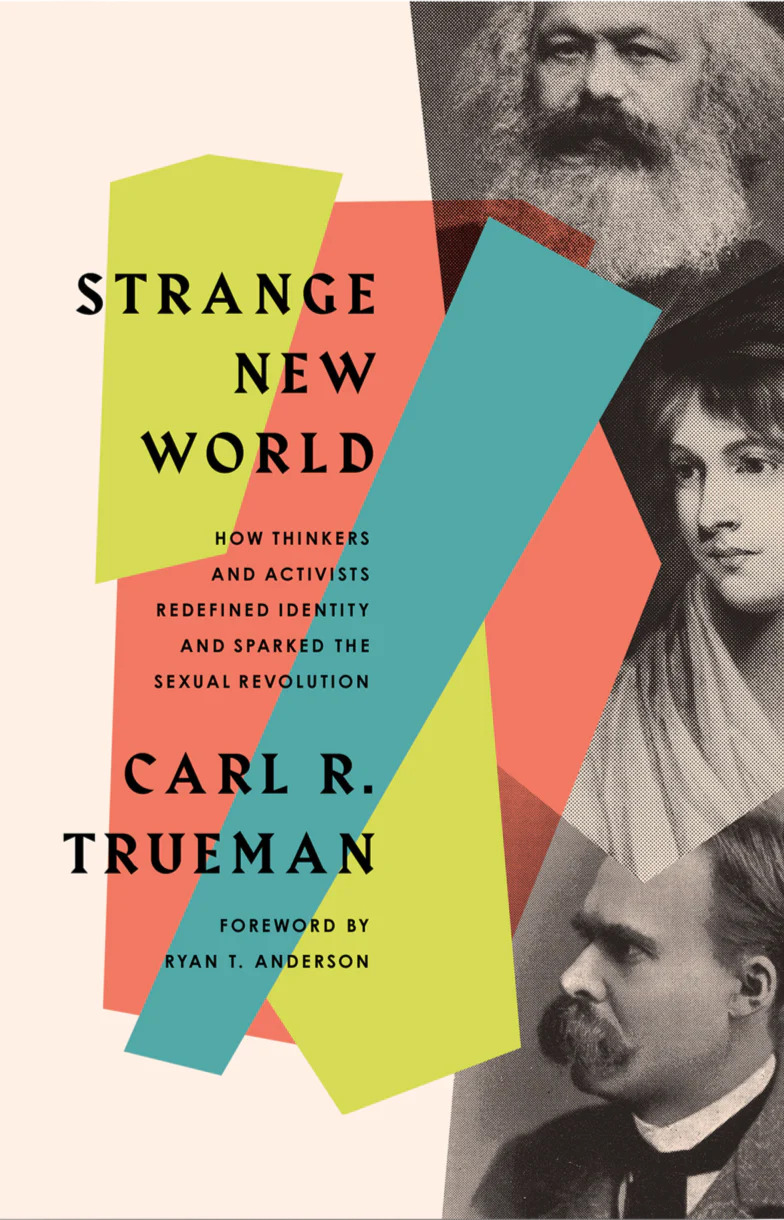In 2020, Carl Trueman’s book The Rise and Triumph of the Modern Self was a smash hit (at least for a Christian book).
This is quite remarkable for a 400-page work of intellectual history, tracing 500 years of Western culture, inspired by the obscure sociologist Philip Reiff.
The Rise and Triumph found surprising fans too. Conservative Jewish commentator Ben Shapiro tweeted, “This is the most important book of our moment.” Deborah Savage in the Catholic World Report declared it “a book of singular importance.”

Strange New World: How Thinkers and Activists Redefined Identity and Sparked the Sexual Revolution
Carl R. Trueman
Strange New World: How Thinkers and Activists Redefined Identity and Sparked the Sexual Revolution
Carl R. Trueman
How did the world arrive at its current, disorienting state of identity politics, and how should the church respond? Historian Carl R. Trueman shows how influences ranging from traditional institutions to technology and pornography moved modern culture toward an era of “expressive individualism.” Investigating philosophies from the Romantics, Nietzsche, Marx, Wilde, Freud, and the New Left, he outlines the history of Western thought to the distinctly sexual direction of present-day identity politics, providing readers with a clearer understanding of the modern implications of these ideas on religion, free speech, and issues related to personal identity. For fans of Trueman’s The Rise and Triumph of the Modern Self, this new book offers a more concise presentation and application of some of the most critical topics of our day.
The most common criticisms of The Rise and Triumph of the Modern Self were that it is long and complicated, burdened with technical terminology, and gives only a cursory consideration of how we might respond to the situation it describes.
This year Trueman has published Strange New World, which “covers the same ground” more accessibly in under 200 pages (with no footnotes). It has a glossary to help with the jargon and its final chapter gives fuller suggestions for Christian response.
If you haven’t read The Rise and Triumph, now is a great chance to catch up with Strange New World.
Explaining Transgender … and Contemporary Culture
Trueman sets out to answer a puzzle. In previous generations, it would have seemed utterly irrational for someone to claim to be a woman trapped in a man’s body (or vice versa). In our culture it is not only understood and accepted but celebrated. How, he asks, has that happened?
While the transgender question is the starting point, Trueman traces the rise of “expressive individualism,” the conviction I need to discover and express the “real me.” He shows how this movement was sexualised and gave rise to the sexual revolution. From the sexual revolution, sexual freedom became politicised, so ‘sexual minorities’ demanded acceptance and affirmation.
The discussion throws light on many features of contemporary Western culture: medical ethics; our fascination with psychology; the demise of religious freedom; patterns of worship; and developments in education. It connects the transgender trend with a long story of Western culture and familiar features of our contemporary society.
This makes the book feel incredibly revealing. Deborah Savage comments on The Rise and Triumph that “as I read through his analysis, there was a feeling of finally having found the full story.”
As I read through his analysis, there was a feeling of finally having found the full story.
History Matters
Trueman’s works show the importance of history. It is almost impossible to understand the current moment without a sense of how things got to be the way they are.
Just as you only understand the location of your home when you can relate it to a local neighbourhood and a wider region; so you need a backstory to ‘get’ the times you live in. Our culture tends to be obsessed with the present (and the future) and relatively dismissive of the past. Trueman’s books show that if we are going to live and witness well in the now, we need to know about then.
Hence, like The Rise and Triumph, Strange New World traces developments through the influence of important thinkers. It offers clear and accessible summaries of the view of Rousseau, Hegel, Marx, Nietzsche, Freud and Reich. Trueman will help you understand these big names in philosophy and why they are important.
If we are going to live and witness well in the now, we need to know about then.
Strange New World is not alarmist. Trueman is not proposing there is a secret plot in which powerful individuals are undoing Western culture. Rather, the tides of ideas and technology touch everybody and shape the way we think and live. It is only possible to think critically and live counter-culturally if we recognise the shifting tide.
Responding to our Culture: Six Suggestions
Strange New World gives more attention (at least relative to its size) to how Christians should respond to a culture of sexualised and politicised expressive individualism. Here are the six suggestions it offers:
- We need to recognise our complicity in the culture. Christians have often bought a version of seeking pleasure and comfort in self-expression. Trueman writes that we need to recognise this, repent, and work at “self-discipline.”
- We can learn from the early church. They lived as a community of “cultural protest” in a pagan world—confident “God plays the long game.”
- We need to address cultural issues (like gender and sexuality) from a broad and deep understanding of God and his Word. Little is gained by alarmist reactions. Rather, we have to set out how the biblical view of God, the world and humanity is different from—and far more beautiful than—what our culture offers.
- We need to allow worship to shape our thoughts and desires. Individualism is correct to recognise God has made humans with desires and emotions. Its error is to make those an end in themselves and a final guide to how we should live. Biblical worship engages our emotions and imaginations with God not with ourselves. It enables us to express our feelings of lament, confusion and joy before God and directs us to him as our point of reference.
- More specifically, Trueman calls for the church to recognise the importance of natural law and develop a fuller theology of the body. Natural law is the view that human life should be patterned by the order which God has put into creation. God’s commands are not arbitrary directions and restrictions; they reflect the way he has made us and the world and direct us on the path of true human life. This approach was part of traditional Christian teaching. It has been eclipsed over the recent generations, but a much-needed recovery is underway.[1] Similarly, there is a growing body of theological reflection on the importance of the body.[2] Christian teachers need to utilise these resources and help us understand our embodied lives.
- Finally, Trueman counsels that we face our expressive culture with realistic Christian hope rather than naïve optimism or overwhelming despair. God’s truth lived out by God’s people will stand the test of time. While it feels there is growing pressure and there are certainly new challenges, now is not the time to lose heart or retreat. Even in this strange new world, Jesus triumphs.
If you have not read the big version, it is certainly worth reading the little brother Strange New World. If you have read the tome, you will find the smaller book a good refresher and something you can give away more easily.
[1] See this short piece by Andrew Walker or the interview with Walker and Kevin DeYoung
[2] See Nancy Pearcey, Love Thy Body: Answering Hard Questions About Life and Sexuality;
John W. Kleinig Wonderfully Made: A Protestant Theology of the Body;
Sam Allbery, What God Has to Say about Our Bodies: How the Gospel Is Good News for Our Physical Selves.















